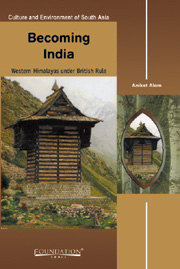Book contents
- Frontmatter
- Contents
- Preface
- Glossary
- Map
- Chapter 1 The Geography of the Western Himalayas
- Chapter 2 Political Economy of the Western Himalayas: Early Nineteenth Century
- Chapter 3 The Foundations of British Rule: Hill State, Hill Station, Land Settlement and Monetisation
- Chapter 4 Peasant Rebellions and Royal Reconciliation: British Rule inside the Hill States
- Chapter 5 Social Movements during British Rule
- Chapter 6 After Independence
- Conclusion
- Bibliography
- Index
Chapter 3 - The Foundations of British Rule: Hill State, Hill Station, Land Settlement and Monetisation
Published online by Cambridge University Press: 26 October 2011
- Frontmatter
- Contents
- Preface
- Glossary
- Map
- Chapter 1 The Geography of the Western Himalayas
- Chapter 2 Political Economy of the Western Himalayas: Early Nineteenth Century
- Chapter 3 The Foundations of British Rule: Hill State, Hill Station, Land Settlement and Monetisation
- Chapter 4 Peasant Rebellions and Royal Reconciliation: British Rule inside the Hill States
- Chapter 5 Social Movements during British Rule
- Chapter 6 After Independence
- Conclusion
- Bibliography
- Index
Summary
British Conquest of the Western Himalayas
The main causes for British engagement with, and final conquest of, the Western Himalayas need to be spelled out in some detail before it is possible to discuss either the nature or phases of British rule or the response to it by the local population. The generic causes of territorial conquest by the British East India Company can be understood and explained through the global context of colonialism based on the requirements of ascendant British capital, which first needed to monopolise trade and later the sources of raw material and captive markets for emergent industries. Any account of colonial conquests in one particular region needs to base itself on these in the first instance, otherwise it has a tendency to become a study of colonialism without perceiving colonialism. But equally important, for a comprehensive historical account, is the study of the specificities of the particular region. The nature and condition of local social and political structures, military strengths and strategies of the different players, the historical relation of this region with other areas both neighbouring and distant, the natural and economic resources of the region and many other such factors need to be given attention.
Three broad concerns got the British interested in the region of the Western Himalayas. It was a major policy concern of the British in India both to curtail the power of the independent rulers and to extend their sway to the ‘natural’ limits of India as quickly as feasible. They had little knowledge about the trans-Himalayan tracts apart from the fact that some form of Chinese, and possibly Russian influence existed there.
- Type
- Chapter
- Information
- Becoming IndiaWestern Himalayas under British Rule, pp. 97 - 146Publisher: Foundation BooksPrint publication year: 2007

